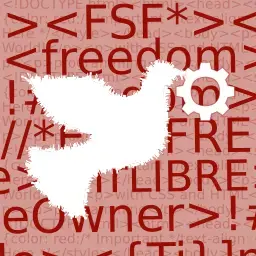

Enlighten me; what is it I’m missing?
Web Developer by day, and aspiring Swift developer at night.


Enlighten me; what is it I’m missing?
That’s fair. I worded that poorly. It’s a crappy yard because it’s drab and boring right now. It doesn’t have grass, and is mostly trees. It’s plain, and I want to spruce it up somehow.


I asked what the OP felt was better about GPLv3.
The person who responded made provably false statements. I know they are false, because I went to look it up; which is outlined in my “[whooped] out references”.


Yo, that dog bowl is off da chain!


GPLv3 is virally open source (copyleft), BSD 2-Clause is not.
Your first statement is patently false and misleading.
Two variants of the license, the New BSD License/Modified BSD License (3-clause), and the Simplified BSD License/FreeBSD License (2-clause) have been verified as GPL-compatible free software licenses by the Free Software Foundation, and have been vetted as open source licenses by the Open Source Initiative. (Wikipedia)
Being “copyleft” is not a requirement for being open source. Maybe you’re thinking of free software. There are differences, but as the FSF is quoted, they are also very similar.
GPLv3 ensures free software remains free and contributions cannot be exploited and withheld from the community. BSD2C does not.
To my understanding, and if I’m wrong I’d love to know why, both GPLv3 and BSD2 both ensure the openness of software. They just go about it differently. GPL (I’m not super versed at v3) basically means any modifications to GPL’d code must also be GPL’d, and source made available; also, if you statically link against other GPL’d code, your code must be GPL’d. Dynamic linking (or linking against LGPL code, like glibc) does not have this requirement.
With BSD code, your only requirement is that the code (or binaries) must remain BSD2. Sure, someone can make modifications and keep them to themselves for fun and profit. But that doesn’t mean the rest of the community has to follow suit. The original code remains open and available with no license modifications. If a company owns BSD2 code, and goes under, the community can simply fork the code and take ownership as they please.
Neither license is perfect, and I’m sure we could find plenty of examples of people/companies that have abused both licenses.
Office politics sure do suck.


I’d love to hear your thoughts on why you feel the GPLv3 is better than the BSD2-clause license LadyBird is using.


I’m very much a laymen, and this is purely my opinion, but this whole idea that people can say whatever they want because of freedom of speech is bullshit. I get it’s nuanced: you’re free to say what you want, but not free from the consequences. Blah blah blah. Problem is, no one can agree on the consequences. People like this can continue to spew their hurtful hate left and right, and nothing is done to them to punish them for their obvious intolerance. Meanwhile, the people that are affected by this vitriolic bullshit have to keep looking over their shoulders every damn day of their lives waiting for the inevitable escalation that will come.
Not true. Look up the Americans with Disabilities Act (ADA) by the EEOC. Here, I’ll do it for you. But if I am mistaken, I’d love to know where it defines the vision criteria for exclusion.
Actually, when I was looking it up, it sounds like you’re talking about being considered legally blind and qualifying for Social Security disability benefits, which is not the same as being protected under the ADA.
You’re right. I made an assumption about where she lives. I shouldn’t have, but I did. The advice about talking to a lawyer to know her rights, though, is universal regardless of where she lives. So I still stand by my statements.

It’s not the heat that dewrinkles clothes. It’s humidity. Try it in a room full of steam.

Two options for dealing with wrinkles:
There is a third option: wear wrinkly clothes and dgaf.
According to the EEOC, it’s a disability:
A vision impairment does not need to “prevent, or significantly or severely restrict,” an individual’s ability to see in order to be a disability, as long as the individual’s vision is substantially limited when compared to the vision of most people in the general population.
And it sounds like her employer is doing the right thing. But if ever she feels she is not being treated fairly, she should talk to a lawyer to be sure. Don’t just let it slide because she has one good eye. Hell it might be good to talk to a lawyer anyway, so she knows what to look out for in the future if things happen to change.


Damnit I was going to post the same thing lol.
Ignoring the fact that a lot of languages, and database systems, do not support generics (but do already support null), you’ve just introduced a more complex type of null value; you’re simply slapping some lipstick on it. 😊


My god that was painful to watch. Skip ahead to the last minute of the video, unless you like being tortured with over the top “Hello, fellow kids” corporate BS.
I’m probably going to get a lot of hate for this, and I do recognize there have been problems with it all over the place (my code too), but I like null. I don’t like how it fucks everything up. But from a data standpoint, how else are you going to treat uninitialized data, or data with no value? Some people might initialize an empty string, but to me that’s a valid value in some cases. Same for using -1 or zero for numbers. There are cases where those values are valid. It’s like using 1 for true, and zero for false.
Whomever came up with the null coalescing operator (??) and optional chaining (?->) are making strides with handling null more elegantly.
I’m more curious why JavaScript has both null and undefined, and of course NaN. Now THAT is fucked up. Make it make sense.
You obviously don’t suffer from a sensitive circadian rhythm. To that I’d say, lucky you. But there are plenty of people who do suffer. And by the time they finally get used to the time change, it’s time to change again. It’s vicious and disruptive; to more than just scheduling. It has a direct (negative) impact on physical and mental health.
Last time I did this, I dedicated (You Make Me Feel Like) A Natural Woman to my now ex-wife.
And I’d do it again!